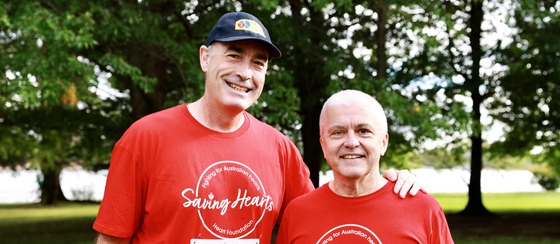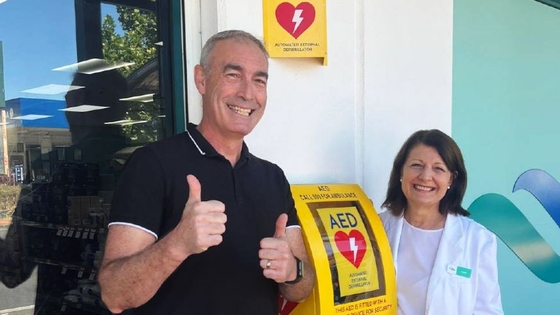
Former yellow Wiggle, Greg Page
“When someone’s heart suddenly stops, the actions of bystanders can make the biggest difference.”
When Greg Page had a sudden cardiac arrest at a Wiggles concert in January 2020, he had never been more grateful for his diehard fans. Thanks to the quick action of an audience member, and an easy-to-access automated external defibrillator (AED), the original yellow Wiggle survived.
“I woke up in hospital and doctors told me I had had a heart attack, which caused my heart to suddenly stop beating,” explains Greg. “Even though my wife Vanessa is a cardiac nurse, I realised there was a lot I didn’t know about my condition.”
Greg’s experience led him to discover that many people lack the confidence to assist someone in cardiac arrest, even though their help can mean the difference between life and death.

When someone’s heart suddenly stops, bystanders are that person’s best chance of survival, even before paramedics arrive. Without bystanders who knew how to do CPR and had access to an AED, I wouldn’t be here.”
Greg Page
Former yellow Wiggle
For Greg, this was the turning point that led him to start his charity Heart of the Nation, which is committed to increasing survival rates from sudden cardiac arrest. “The mission of Heart of the Nation is to ensure that every Australian knows that when someone isn’t responsive or breathing properly, they are that person’s lifeline,” says Greg. “They can be confident to respond in the right way, which is to Call, Push, Shock.”
Call, Push, Shock are the three actions bystanders can take to help save the life of someone in cardiac arrest. “Call Triple Zero (000), push hard and fast in the middle of the person’s chest to give CPR, and deliver a shock using an AED,” explains Greg.
Improving access to life-saving AEDs is an important part of Heart of the Nation’s work. Research shows that the overall rate of survival from a cardiac arrest is incredibly low. But acting quickly can save lives. If a bystander uses a defibrillator, the survival rate is around 50%, compared with 27% if waiting for the paramedics.
To help spread this message, the Heart Foundation and Heart of the Nation are joining forces to save more lives from sudden cardiac arrest.

The Heart Foundation has an incredible history in Australia and is the source of such great information and research on heart health. Working with the Heart Foundation, Heart of the Nation will be able to draw upon years of experience to educate people about this critical national health issue.”
Greg Page
Heart of the Nation
As a long-time friend of the Heart Foundation, Greg is also a proud ambassador for this year’s Hand on Heart campaign. “Funding for programs, projects and research to save lives is essential,” he says. “It’s only with the generous support of the public that we can achieve this.”
By pushing boundaries, by exploring new treatments, and by continuing to inform, we can help save lives and improve the lives of people touched by heart disease, including sudden cardiac arrest. Thanks to the generous support of everyday Australians, we can continue to help fund ground-breaking research to help save more lives and keep more families together.
Help make heart disease history. Donate today.
You might also be interested in...
.jpg?width=560&height=auto&format=pjpg&auto=webp)
What is a cardiac arrest?
With immediate help a cardiac arrest can be survived. Learn what the signs of cardiac arrest are, why it’s different to a heart attack, and the steps you need to talk to help someone in cardiac arrest.

Heart Foundation and Heart of the Nation join forces to save more lives from sudden cardiac death
The two organisations have just signed a Memorandum of Understanding to bolster community and Government action relating to CPR and defibrillator access and use.

Cardiac arrest: There is no training required to save a life, just a little education
Particularly in the case of sudden cardiac arrest, because this is when someone’s heart abruptly stops beating, for no apparent or obvious reason.
Last updated30 June 2024